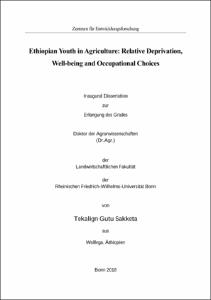Sakketa, Tekalign Gutu: Ethiopian Youth in Agriculture: Relative Deprivation, Well-being and Occupational Choices. - Bonn, 2018. - Dissertation, Rheinische Friedrich-Wilhelms-Universität Bonn.
Online-Ausgabe in bonndoc: https://nbn-resolving.org/urn:nbn:de:hbz:5n-49952
Online-Ausgabe in bonndoc: https://nbn-resolving.org/urn:nbn:de:hbz:5n-49952
@phdthesis{handle:20.500.11811/7338,
urn: https://nbn-resolving.org/urn:nbn:de:hbz:5n-49952,
author = {{Tekalign Gutu Sakketa}},
title = {Ethiopian Youth in Agriculture: Relative Deprivation, Well-being and Occupational Choices},
school = {Rheinische Friedrich-Wilhelms-Universität Bonn},
year = 2018,
month = mar,
note = {Africa has the highest share of young people in the world relative to the total population, with the median age of the population under 25 years old, which is not expected to change in the coming decades. This high proportion of young people, combined with other factors, has prompted a sharp rise in youth unemployment in many Sub-Saharan African countries, including Ethiopia, with implications for Africa’s social and economic future. This thesis examines the current dynamics of youth employment, occupational choices, and factors driving these dynamics within the agricultural sector in Ethiopia across space, time, and gender. Using gender and age specific values of agricultural labor return from farm-level panel data collected from a sample of youth and households, the second chapter econometrically investigates the effect of marginal products of labor (or shadow wages) on youth agricultural labor supply across gender and farm locations. I show that changes in economic incentives (or shadow wages) matter for youth’s involvement in agriculture, but their impact differs for young men and women.
Relative concerns are one mechanism through which income or wealth inequality is hypothesized to affect human behaviour, with consequences on well-being. Employing survey experimental methods and a socio-demographic survey, the third chapter finds that positional concerns for income vary across household members (youth, mothers and fathers) impacting on the youth’s well-being. Chapter four extends the analysis of relative concerns from income per se to consider social as well as assets (non-monetary) RD, using objective and subjective measures. The evidence suggests that while income RD has a motivational impact (resulting from a “positive externality”), assets, and social capital RD have deterrent impacts (resulting from a “status effect”) on the well-being of youth, though this varies across young men and women. The thesis also aids understanding of the implications of different forms of RD by examining their interactions with both the underlying drivers of occupational choices of young people and the occupational choices themselves. Using different estimation techniques, chapter five finds that RD is a strong predictor of occupational choices of the rural youth and their engagement in agriculture (irrespective of the RD and occupational choice indicators employed), together with an influence of the preferences and attributes of the parents.},
url = {https://hdl.handle.net/20.500.11811/7338}
}
urn: https://nbn-resolving.org/urn:nbn:de:hbz:5n-49952,
author = {{Tekalign Gutu Sakketa}},
title = {Ethiopian Youth in Agriculture: Relative Deprivation, Well-being and Occupational Choices},
school = {Rheinische Friedrich-Wilhelms-Universität Bonn},
year = 2018,
month = mar,
note = {Africa has the highest share of young people in the world relative to the total population, with the median age of the population under 25 years old, which is not expected to change in the coming decades. This high proportion of young people, combined with other factors, has prompted a sharp rise in youth unemployment in many Sub-Saharan African countries, including Ethiopia, with implications for Africa’s social and economic future. This thesis examines the current dynamics of youth employment, occupational choices, and factors driving these dynamics within the agricultural sector in Ethiopia across space, time, and gender. Using gender and age specific values of agricultural labor return from farm-level panel data collected from a sample of youth and households, the second chapter econometrically investigates the effect of marginal products of labor (or shadow wages) on youth agricultural labor supply across gender and farm locations. I show that changes in economic incentives (or shadow wages) matter for youth’s involvement in agriculture, but their impact differs for young men and women.
Relative concerns are one mechanism through which income or wealth inequality is hypothesized to affect human behaviour, with consequences on well-being. Employing survey experimental methods and a socio-demographic survey, the third chapter finds that positional concerns for income vary across household members (youth, mothers and fathers) impacting on the youth’s well-being. Chapter four extends the analysis of relative concerns from income per se to consider social as well as assets (non-monetary) RD, using objective and subjective measures. The evidence suggests that while income RD has a motivational impact (resulting from a “positive externality”), assets, and social capital RD have deterrent impacts (resulting from a “status effect”) on the well-being of youth, though this varies across young men and women. The thesis also aids understanding of the implications of different forms of RD by examining their interactions with both the underlying drivers of occupational choices of young people and the occupational choices themselves. Using different estimation techniques, chapter five finds that RD is a strong predictor of occupational choices of the rural youth and their engagement in agriculture (irrespective of the RD and occupational choice indicators employed), together with an influence of the preferences and attributes of the parents.},
url = {https://hdl.handle.net/20.500.11811/7338}
}






